Paul’s Missionary Journeys
Presbyterian Men's Breakfast - April 10, 2016
We all know Paul went on at least three missionary journeys, but it’s not easy to piece them together. His itineraries have to be inferred from what we read in the Book of Acts, and from hints Paul gives in his Letters. Scholars have put together some good guesses, and I pored through many of them -- and the Book of Acts -- to construct a reasonable summary. Because it’s easy to get lost between the ancient place names and today, I made a few maps to help anchor us, and they are also on my website, gort.net. Going through the stories of his journeys, a clear picture emerges, not only of the geography, but of the spiritual growth Paul himself went through. As we reflect on his spiritual journey we might see some parallels to our own journey.
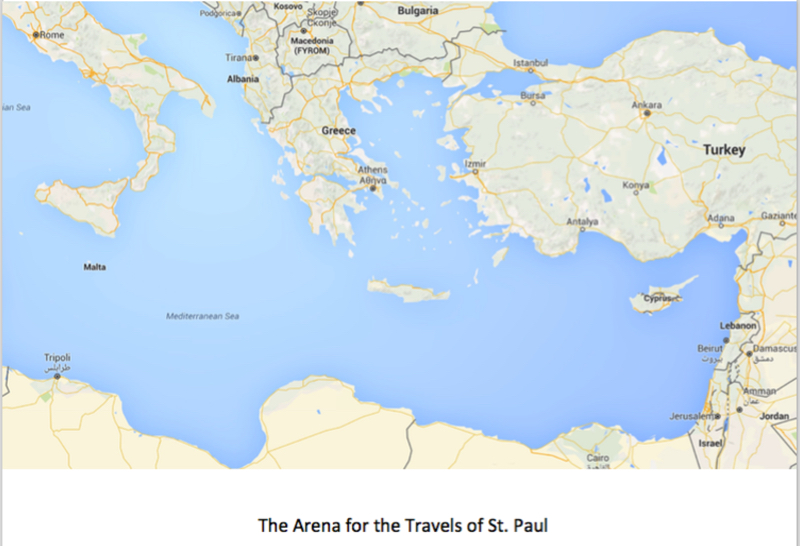 |
Here is where our story begins: Paul, of course, is the writer of most of the Letters in the New Testament and the founder of Christianity. Paul or Saul as he was at the start, was a Roman citizen and a Jew from Tarsus in Turkey next to Syria. Saul was a graduate student in Jerusalem and a fire-breathing anti-Christian zealot in the years after Jesus' crucifixion.
The prelude to his missionary journeys happened on the road from Jerusalem to Damascus.
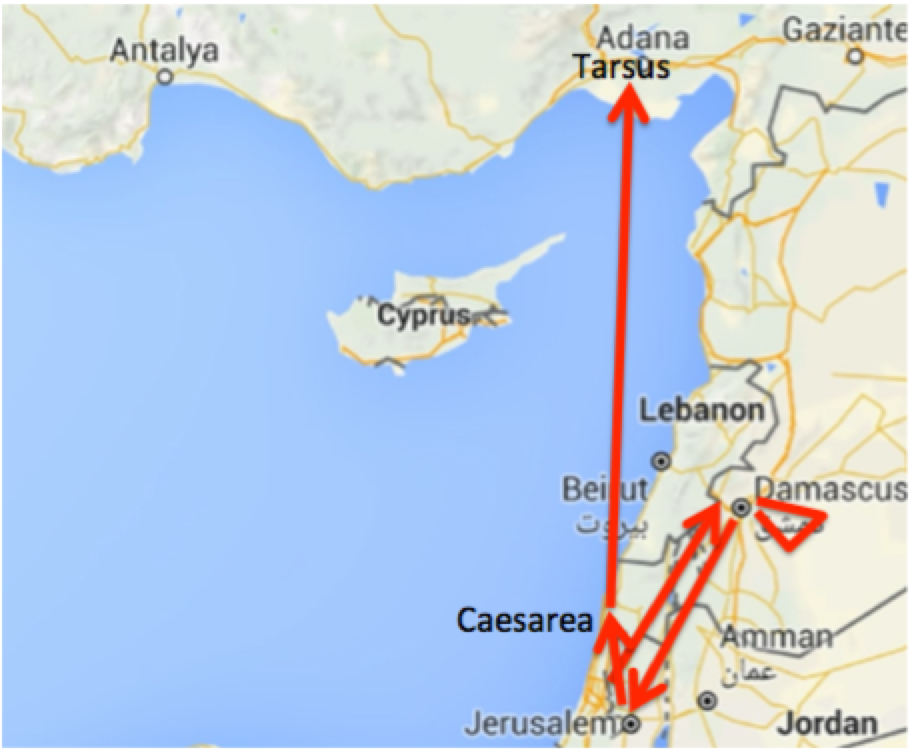 |
The new heretical sect of Messianic Judaism was spreading, and Christian disciples had reached the Jewish communities in Syria and eastern Turkey. Saul was after them with a vengeance. On the road to Damascus Jesus showed Saul his spiritual blindness by flashing a divine light, physically blinding him. Then, after new sight was given to him in Damascus, Saul, like Jesus and the prophets before him, went to the desert for a time. Maybe he did some quiet contemplation assimilating this new vision. This time in "Arabia" prepared Saul to begin preaching Jesus to the Jews of Damascus. Now the persecutor had become preacher. This turnabout antagonized many orthodox Jews who, as Saul used to be, were violently opposed to this Jesus heresy. Saul was forced to escape and friends let him down from the Damascus city wall in a basket. Returning to Jerusalem, he looked up the Apostles and disciples. Knowing the former Saul, they were mistrustful, but Barnabas convinced the brothers the new Saul was for real, and they welcomed him. But his preaching in Jerusalem, stirred up the same orthodox hornet's nest and Saul fled to Tarsus, his home.
There Saul argued and encouraged the new believers, both gentile and Jew in his hometown synagogue. Evangelizing his neighbors undoubtedly served as practice, and any resistance would have helped thicken his spiritual skin. Meantime, Barnabas was sent north to nearby Antioch to help out the new believers there.
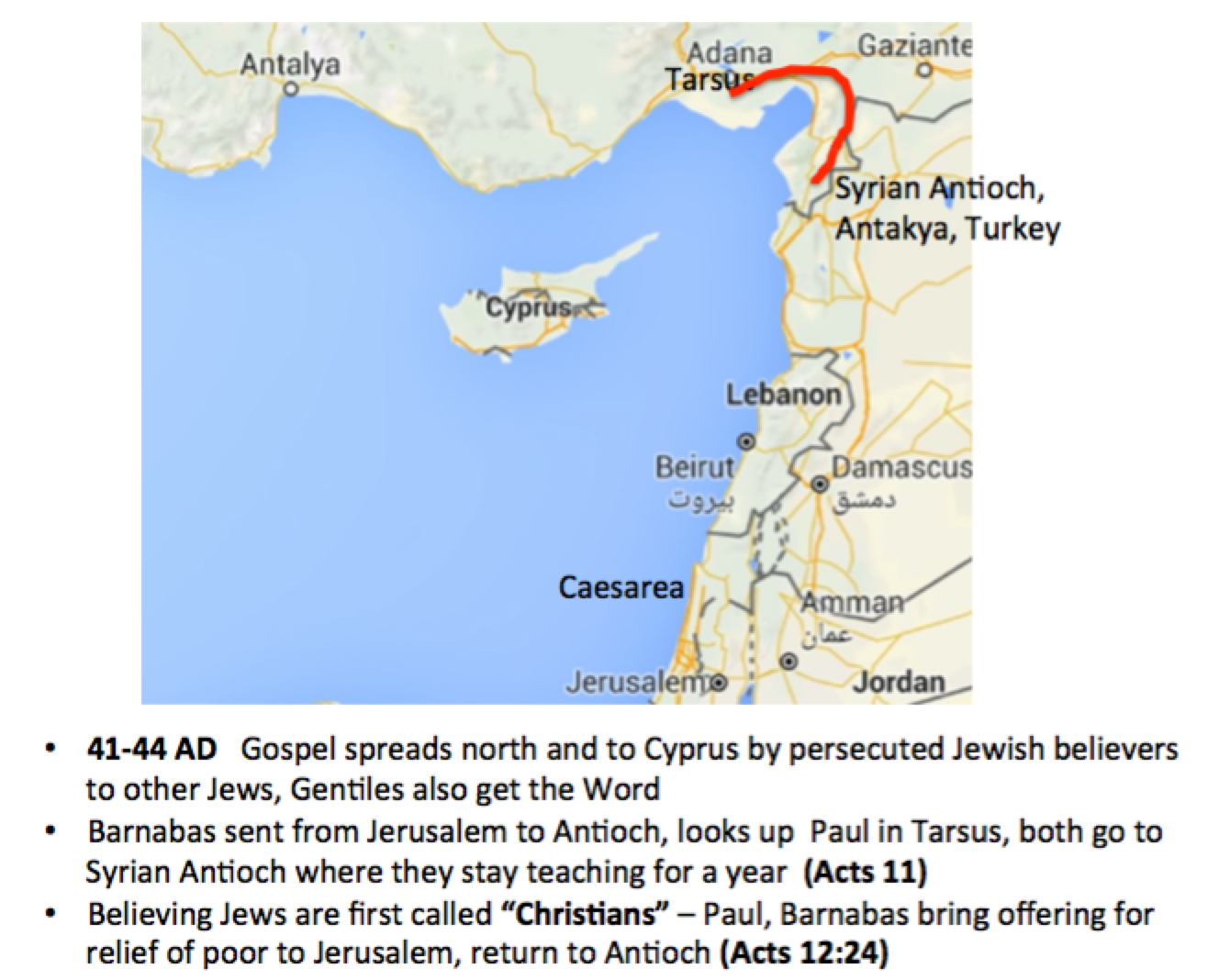 |
He looked up Saul in Tarsus, and the two of them preached Jesus in Syrian Antioch before heading off on the first missionary journey. The first journey stayed close to home, beginning in Cyprus, Barnabas' home island. Both had now preached the word in their hometowns, and were ready to move a little farther afield. But not all that far. Although they traveled several hundred miles, their target, Pisidian Antioch, was not that far overland from Tarsus. We know that at Perga, before they get to Pisidian Antioch, their companion John Mark decides to leave them and return to Jerusalem. Maybe faint heart?
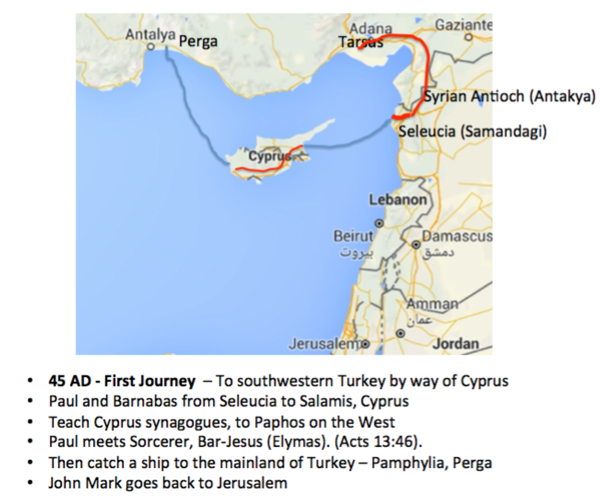 |
Saul and Barnabas preach in the synagogue of Pisidian Antioch. Pisidia was familiar territory for the two evangelists. The dialect and customs were familiar, but it was out of town. They won believers, but stirred resentment, and so they headed east, arguing, teaching and being stoned as they went. Finally, at Derbe, you wonder why Saul didn't just keep going east and walk home to Tarsus, licking his wounds.
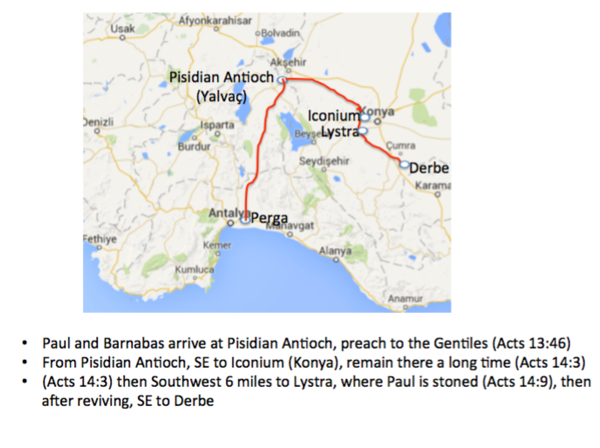 |
Spiritually stronger and tougher now, Paul and Barnabas retrace their steps, preaching and teaching in the same towns they’d passed through until back at Perga they were ready to preach there as well.
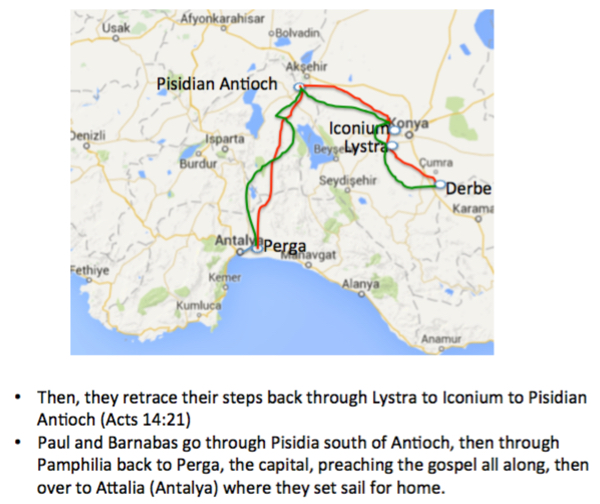 |
For good measure they went down to Antalya preaching Christ before shipping home, ending the first journey.
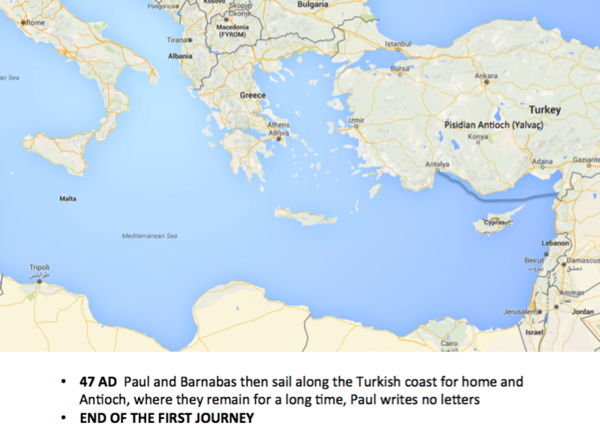 |
It was probably time for a little rest and recovery, since Paul was almost killed by stoning the first time through Lystra. The decision to return to the places where he was violently rejected rather than just walking home may be the moment of transition from Saul to Paul. Saul means asked for. Paulus means small, or humble.
Before the second Journey, Paul and Barnabas go to Jerusalem for the first Church Council.
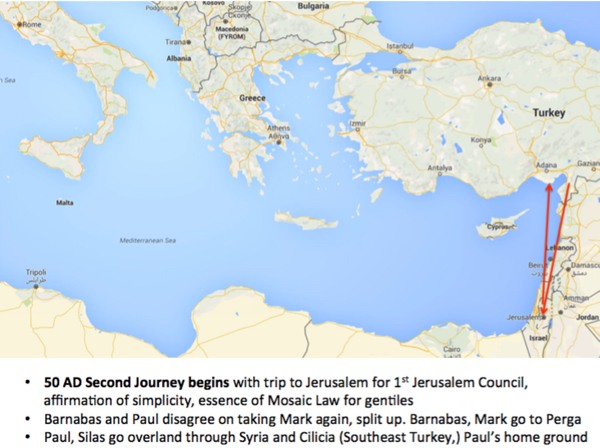 |
The apostles and disciples reach agreement that gentiles are allowed to become full members of the new Way without needing to follow the Jewish Mosaic Law. No adult circumcision, no dietary laws. Now Paul is in full accord with Peter and James on the gentile issue, ready for serious evangelizing of non-Jew as well as Jew.
The second journey starts from Syrian Antioch. Paul and Barnabas split over taking John Mark again. Barnabas heads for Cyprus again with John Mark, and disappears from the Bible and our story. Paul, now accompanied by Silas, makes his own way, by land this time, back to Derbe, Lystra, Iconium and Pisidian Antioch to encourage the believers and get the Churches organized. Paul knew the Word needs reinforcement; new believers need examples and encouragement, and by appointing Elders, Paul began the necessary process of forming up the new community. Paul knew that a religion of ones or twos can't persevere. As much as we sometimes resist formal institutions, we humans need structure to keep us on the rails. So he starts this journey by re-enforcing and supporting the fragile new "Churches within the synagogues." Then Paul and Silas go beyond Pisidian Antioch into new territory.
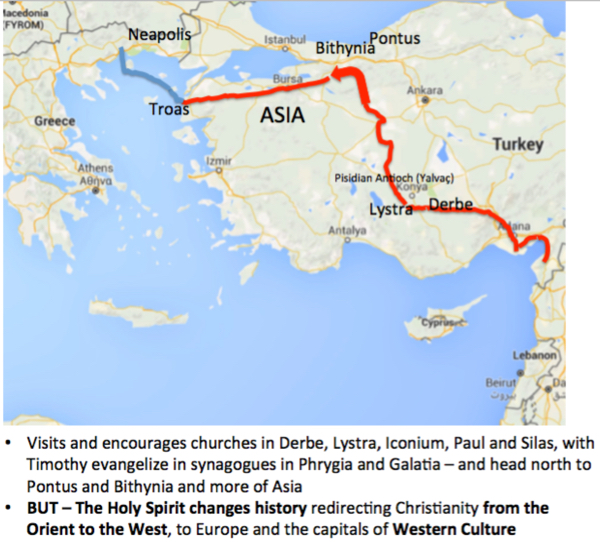 |
Here is something we often overlook when we reflect on Paul's missionary journeys: Paul's teaching and evangelizing took place in Jewish synagogues, but gentiles were also hearing the Word. Gentile believers in the One God were welcomed into Jewish worship services. Although they were not "full members" of the community and they were not required to follow the 613 rules of the Law, they were there. These "God-fearing gentiles" in the synagogues were an early fruit. Looking back, we can see the Wisdom of God in first giving the Word to the Jewish people who both at home and in exile, would establish beachheads for God in the pagan world. Without the familiarity, practice and presence of Judaism, there would not have been an effective "soap-box" to evangelize the gentile world. Paul and Silas preached The Messiah to the God-fearing gentiles as well as to the Jews, but there was confusion. Were the gentiles now Jews? Back in Syrian Antioch the believers were first called "Moshiachim" which means, "followers of the anointed one." In Greek and later English this name would later translate as "Christians." The new believers saw themselves as part of Judaism. This is the context for that First Jerusalem Council.
As Paul and Silas moved north towards the Black Sea and Istanbul, their intention was to circle through Asia and perhaps down to Ephesus on the coast, preaching in the synagogues. But the Spirit had something else in mind. The Spirit turned them away from Asia at this time and instead led them to the Western world - to Macedonia and Greece.
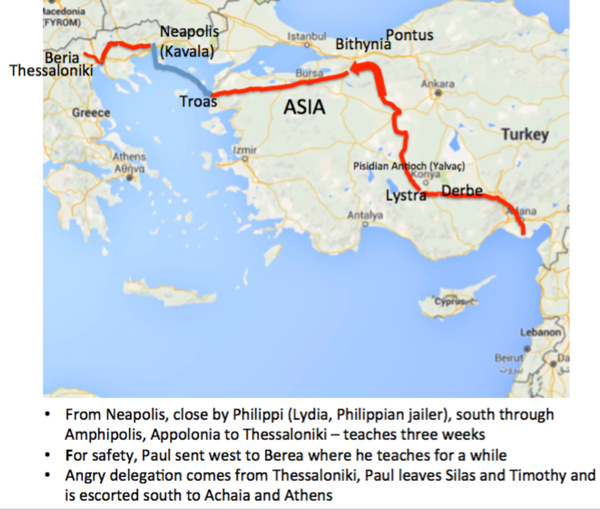 |
The isolated Jewish communities in the West were frontier outposts of monotheism in a pagan world. The West was logical, reasonable, philosophic and idolatrous. The West was pagan. The West was the home of Plato, Aristotle, and the Greek academies, the home of Zeus, Athena and the power and might of imperial Rome. Roman Caesars were men who were to be worshipped as gods. Isolated communities of Jews and synagogues were scattered throughout the western Roman Empire. These Jews were usually tolerated by Rome as useful, if eccentric craftsmen and merchants. Because they were useful to Rome, their strange oriental religion was tolerated by the empire. But, the Jews were few, isolated and powerless. This is the world to which God sent Paul and Silas in the middle of the second missionary journey. Is Paul now ready for this? God thought so. Are we?
They land near Philippi not knowing a soul. Their mission to the west is facilitated by a woman. Acts tells of the encounter with Lydia, a God-fearing woman of substance from Asia who after her own baptism houses them and the new Philippian believers. Traveling overland they reach the synagogue of Thessaloniki. Many of the Thessalonian Jews resist this heresy, and their threats force Paul to leave town.
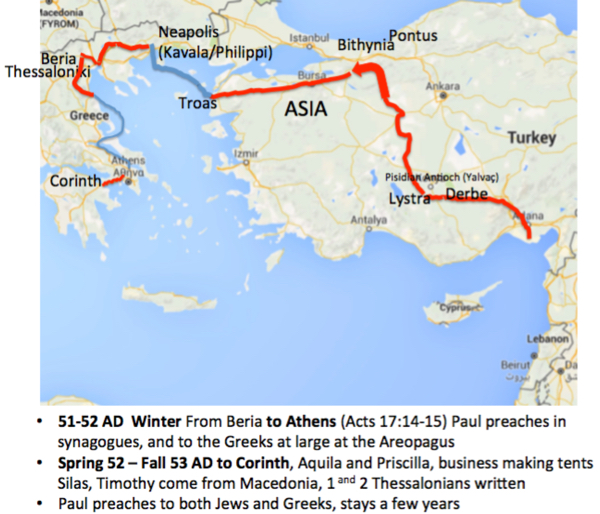 |
His escorts lead him by sea to Athens itself. Now in Athens, Paul argues in the synagogue and preaches from the Areopagus, the great rock of a pulpit standing at the top of the Athenian Agora. Here he truly becomes a Greek to the Greeks. Gesturing to one of the temples in the agora Paul preaches; "I see you are very religious. You even have an altar dedicated to an Unknown God. This is the God of whom I speak." Paul is tolerated in Athens because the Greeks are philosophers with "itching ears," eager to hear new ideas. Even so, a few believe.
Paul moves further west from intellectual, aloof Athens to the gritty commercial crossroads of East and West, the port city of Corinth and its synagogue. Here both Paul and Christianity reach another stage of spiritual growth. Paul meets up with Aquila and Priscilla, a Jewish couple recently kicked out of Rome in one of the frequent pogroms. All skilled at the same craft, Paul, Priscilla and Aquila go into the tent-making business together in Corinth. Paul, now a businessman, sets up in Corinth and for several years preaches Christ to both Jew and Gentile. Here he writes two letters encouraging and disciplining the believers he’d earlier taught in Thessaloniki, letters we know as 1 and 2 Thessalonians.
What is driving this man? Where is the energy coming from? How can he live in the everyday world making a living, and at the same time preach, teach, write, and develop what becomes the greatest institution on Earth? Paul shows us that by expending all, giving God everything you have, more perseverance and power come. Not by might, not by power, but by my Spirit says the Lord. And, let's not forget, God also gave Paul the help of two formidable women, Lydia and Priscilla.
In time, Paul, Priscilla and Aquila sail across the Aegean to Ephesus. Paul leaves his partners and preaches in the Ephesian synagogue. The believers ask him to stay on, but he tells them, "...another time, I will return." Paul sails home to Syrian Antioch. The end of the second missionary Journey.
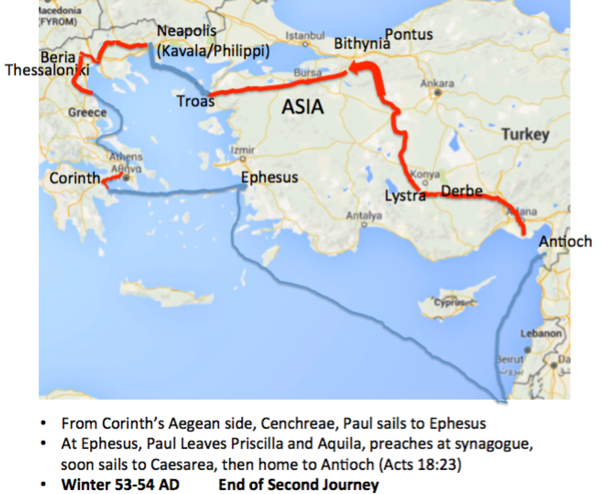 |
The third journey begins with Paul returning to encourage the Churches he’d planted from Derbe to Pisidian Antioch. This time the Spirit permits him to evangelize across Asia and now reach Ephesus by land. On the way, Paul perhaps formed the seven Asian Churches which we know as the seven Churches in Revelation. In Ephesus, while preaching in the synagogue, he encounters the usual resistance. This time, Paul takes his Jewish and gentile believers out of the synagogue and sets up worship in another building. This "rental" of a hall in Ephesus marks the birth of the Eastern Orthodox Church and the beginning of the split between Christianity and Judaism.
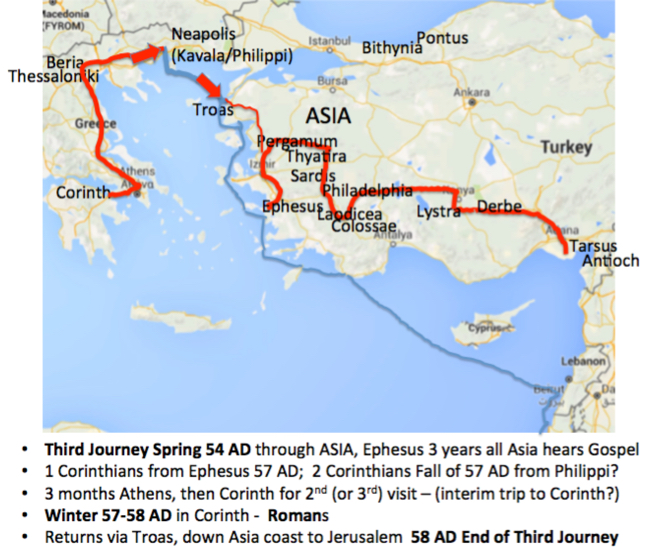 |
Paul is again called to the West and his beloved Corinth. Paul goes the long way around, revisiting the Churches of Macedonia and Greece on the way. Persevering, teaching, encouraging, he writes his 2nd letter to his beloved Corinthians - maybe from Philippi. Repetition, visits, encouragement, resolving disputes, pastoring, personally teaching, persevering. This is a lesson and message in Paul's visits and letters to the Churches - and to us. Keep at it, pray and work without ceasing. God will provide the power.
Back in Corinth for winter of 57-58 AD Paul writes the most powerful and complete statement of Christianity to this day - the Letter to the Romans. In the spring, Paul revisits the Greek Churches on his way back to Asia, and makes his farewell address to the Elders of Ephesus before his final trip to Jerusalem. End of the third journey.
In Jerusalem, he preaches, is beaten, dragged before the Sanhedrin and imprisoned in Caesarea. While a prisoner for two years, he preaches until, claiming his right as a Roman citizen, he is shipped as a prisoner to Rome - beginning the fourth missionary journey.
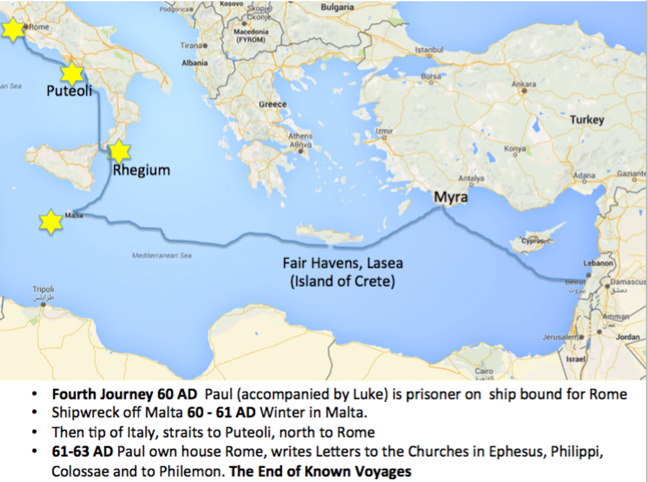 |
Acts details Paul's trip as a prisoner. From Myra they catch a freighter bound for Rome, but shipwreck off the Maltese coast. Paul evangelizes the islanders. Reaching Rome, Paul preaches and writes encouraging teaching letters to the Churches in Ephesus, Philippi, and Colossae and even a short letter to his friend Philemon.
63 AD in Rome, marks the end of the fourth and final recorded missionary voyage of Paul.
Still Paul persevered. The Letter to Hebrews was written a few years later, we don't know from where. He may have revisited the coastal islands, the Ionian coast of Greece, Spain, even Britannia. Tradition has Paul executed outside Rome during Nero's time in 64 or 65 AD. But through Paul, the Word and teaching of God continues to this day, to the Jew first and then to the world.
Among Paul's last words are these to his good friend Timothy. "For I am already being poured out like a drink offering, and the time for my departure is near. I have fought the good fight, I have finished the race, I have kept the faith."
Saul kept the faith. He emptied himself of self again and again becoming Paulus, small; tirelessly revisiting, repeating, teaching, encouraging others in the faith. Persevering. The Word finally got to us here today.
Good work, Saul. Thanks.
End of presentation.
Here are a few reflections on the meaning of the journeys to me. What are some of your reflections?
John Mark did not persevere at Perge. Paul wouldn't take him on the second journey. Perhaps Paul sensed that John Mark would be even more timid going farther afield on the next journey, since he hadn't exposed himself to the persecutions Paul and Barnabas received on the first journey. Perhaps Paul felt the unwillingness of his friend to take the hard road would be a hinderance to Paul as he struggled to go forward himself. Each journey, with its perseverance and persecutions seemed to prepare Paul more and more for the next. Our choice of companions on the road is imortant.
Paul's perseverance at every step is a lesson that helps me better understand Jesus teaching on the mount; Blessed are those who are persecuted because of righteousness, for theirs is the kingdom of heaven. Blessed are you when people insult you, persecute you and falsely say all kinds of evil against you because of me. Rejoice and be glad, because great is your reward in heaven, for in the same way they persecuted the prophets who were before you.
We will not be persecuted if we keep our mouths shut, if we go into a shell or if we don't try. It's hard to expose yourself; to take the risk of opening up and being vulnerable. We will be hurt. It's easier to give in and go along with the crowd. It's hard to go in a different direction, the direction you know is right in your heart. Maybe we have to go through the pain and stresses of small moral struggles - with ourself first, then with others, before we can experience more growth as a full human person. Jesus told the parables of the coins and the talents; (1) Those who have will be given more, those who have not will lose even the little they have. (2) Because you have persevered in small things you will receive greater. Ten coins? Ten cities.
Our "small" daily decisions are far more important than we think. Our lives are far more important than we think. Each of us contains the entire cosmos, the elements of the stars in these bodies we inhabit. Paul hints in 1 Corinthians; If the whole body were an eye, where would the sense of hearing be? As each body has an eye, the organ of sight, we are the universe's organ of conscious moral decision. Each one of us is a small organized collection of stardust given the ability to exercise free will to think and act against our "nature." We are both made of stardust and connected to the stars in ways our minds cannot comprehend. Each decision we take affects galaxies.
- Larry